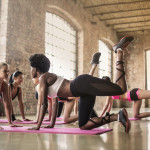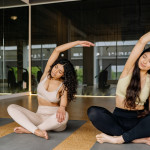8 Tips to Get the Most out of Yoga: A Blog for Seniors
Avoid the challenging poses.
It is important to avoid poses that could strain your body. For seniors, this means avoiding poses like handstands and headstands. These poses should only be attempted by those with good balance who don't have any medical issues or injuries.
If you are just starting out, look for classes that specifically cater to the elderly population, which will help you ease into yoga and ensure your safety.
Avoid poses on the floor.
Many seniors have some form of arthritis or back issues which can make getting into a pose that requires you to lay flat uncomfortable, if not painful. Some modifications include doing the same pose while standing instead of laying down.
Try more chair poses.
There are many chair poses that will still give you a great workout while allowing you to maintain a good balance. This is particularly important for those who have issues with the nerves in their feet which can cause numbness and tingling. If possible, try out different types of chairs, such as exercise ball chairs, so that your muscles are required to work harder throughout the class.
Bend with your knees
If you have arthritic hips, it is important to be mindful of how often you put weight on them. If possible, try bending from the waist and pulling yourself down using your leg muscles instead of pushing off with your legs. This will help avoid putting pressure on the joints in your pelvis and hips, which can lead to pain.
Bring a support blanket.
A support blanket can be helpful for seniors who have trouble balancing or those who are more comfortable with a little extra padding. It also provides warmth, which is especially nice in the cooler months.
Take breaks when needed.
It's important to listen to your body and take breaks when you need them. It is normal for your body to hurt after a yoga session, but if you feel like the pain in your muscles or joints is becoming serious, then it's time to take a break. Yoga does not have any negative side effects when done correctly and should help reduce aches and pains over time.
Stay hydrated
You want to make sure to drink plenty of fluids before and after your yoga session. This will help flush out any toxins that were released during your practice and prevent you from feeling dehydrated.
Wear comfortable clothes
Loose, comfortable clothing is best when practicing yoga. It's important to be able to move freely without having to worry about your clothes getting in the way.
These are some of the best ways to get the most out of your yoga practice. Be sure to start slow and listen to your body. Yoga should feel good and help you relax, not cause more stress or pain.













